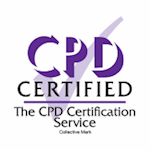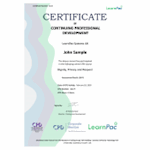Dignity, Privacy and Respect Training - Level 2 - Online Course - CPD Accredited
CPDUK Accredited | Instant Course Access | Includes Assessment & Certificate | Instant Certificate Download
LearnPac Systems
Summary
- Certificate of completion - Free
- Exam(s) / assessment(s) is included in price
- Tutor is available to students
Add to basket or enquire
Overview
Dignity, Privacy and Respect Training - Level 2 - Online Course - CPD Accredited
Welcome to our online Dignity, Privacy and Respect training course for front-line healthcare and social care providers. All our online training courses, programmes and qualifications are accredited by the CPD Certification Service (CPDUK).
The dignity challenge describes values and actions that high-quality services that respect people’s dignity should:
- Have a zero-tolerance of all forms of abuse,
- Support people with the same respect you would want for yourself or a member of your family, and
- Treat each person as an individual.
As with dignity, privacy is open to interpretation and means different things to different people. To respect people’s privacy, services must be personalised as much as possible.
Certificate duration: 2 years
Entry requirements: No entry restrictions
Recommended prerequisites: N/A
Assessment type: End of course assessment
Assessment pass mark – 80% needed to pass and gain a CPD certificate
Cost(s) of assessment and certification – All costs included in the course price
Awarding/Accrediting body – CPD Certification Service (CPDUK)
Dignity, Privacy and Respect Training - Level 2 - Online Course - CPD Accredited.
CPD
Course media
Description
Course aims
The aims and objectives of this online Dignity, Privacy and Respect training course are to:
- To provide the learner with a clear understanding of the legislation regarding equality, dignity, privacy and respect, and
- Provide the learner with a full understanding of the current dignity, privacy and respect guidance for health and social care workers.
Learning outcomes
On completion of this online Dignity, Privacy and Respect training course, the learner will be able to:
- Define equality, dignity, privacy and respect,
- Ensure privacy and dignity in their work,
- Help service users to make choices,
- Recognise the dignity factors,
- Observe the principles of privacy of information,
- Understand the key legislation relating to dignity and respect,
- Refer to their organisational policies and procedures for guidance,
- Understand the importance of risk assessment and mitigation,
- Know the importance of whistleblowing and dignity, and
- Deliver person-centred care.
Why is this online Dignity, Privacy and Respect training course?
Dignity in care work focuses on the value of every person as an individual. It means respecting other’s views, choices and decisions, not making assumptions about how people want to be treated and working with care and compassion.
What does dignity mean in health and social care practice?
Dignity in social care ensures individuals who receive care and support can make choices about the care they receive. This includes decisions about everyday care needs, such as:
- Personal hygiene,
- Meal and drink choices,
- Communication,
- Social interaction,
- Pain management, and
- Moving and assistance.
Care Quality Commission (CQC) guidance on dignity and respect
Health and Social Care Act 2008 (Regulated Activities) Regulations 2014: Regulation 10 – This regulation intends to make sure that people using the service are treated with respect and dignity at all times while they are receiving care and treatment. To meet this regulation, providers must make sure that they provide care and treatment in a way that ensures people’s dignity and treats them with respect at all times. This includes making sure that people have privacy when they need and want it, treating them as equals and providing any support they might need to be autonomous, independent and involved in their local community.
What is privacy in health and social care?
Respect people’s right to privacy’ is the sixth point of the dignity challenge. As with dignity, privacy is open to interpretation and means different things to different people. To respect people’s privacy, health and social care services must be personalised as much as possible.
What is covered in this course?
This online Dignity, Privacy and Respect training course covers the following:
- Introduction to equality, dignity, privacy and respect
- Definition of dignity, privacy and respect
- Understanding privacy and dignity
- Privacy and dignity in care and support
- Helping people to make choices
- Recognising the dignity factors
- Principles of privacy of information
- Legislation relating to dignity and respect
- Organisational policies and procedures
- Risk assessment
- Supporting active participation
- Encouraging self-care
- Whistleblowing and dignity
- Complaints and dignity
- Abuse and dignity
- Dignity for health and social care workers
- Specialist care and specific care needs
- Person-centred care
- The 10 point dignity challenge.
Dignity, Privacy and Respect Training - Level 2 - Online Course - CPD Accredited.
Who is this course for?
Who is the course for?
This Dignity, Privacy and Respect e-learning course should be completed by those who work in health and social care services including:
- NHS medical, nursing, AHP and care staff
- Locum doctors and nurses
- Locum allied health professionals (AHPs)
- Agency nurses
- Agency workers
- Healthcare assistants
- Support workers
- Care assistants
- Community services.
Dignity, Privacy and Respect Training - Level 2 - Online Course - CPD Accredited.
Requirements
Learn anywhere, anytime on any device.
You will need access to a desktop computer, laptop, tablet or smartphone device to complete these online courses. You can start, pause/stop and return to where you left off.
Our courses utilise responsive design features, making them available on any device of your choice.
Dignity, Privacy and Respect Training - Level 2 - Online Course - CPD Accredited.
Career path
Our online courses and programmes range from introductory modules at Level 1 (awareness/beginner) to advanced and expert modules up to Level 6.
Our e-learning modules count towards CPD hours for professionals in various sectors as well as meeting mandatory and statutory requirements (where relevant).
Dignity, Privacy and Respect Training - Level 2 - Online Course - CPD Accredited.
Questions and answers
Currently there are no Q&As for this course. Be the first to ask a question.
Certificates
Certificate of completion
Digital certificate - Included
Reviews
Currently there are no reviews for this course. Be the first to leave a review.
Legal information
This course is advertised on reed.co.uk by the Course Provider, whose terms and conditions apply. Purchases are made directly from the Course Provider, and as such, content and materials are supplied by the Course Provider directly. Reed is acting as agent and not reseller in relation to this course. Reed's only responsibility is to facilitate your payment for the course. It is your responsibility to review and agree to the Course Provider's terms and conditions and satisfy yourself as to the suitability of the course you intend to purchase. Reed will not have any responsibility for the content of the course and/or associated materials.





